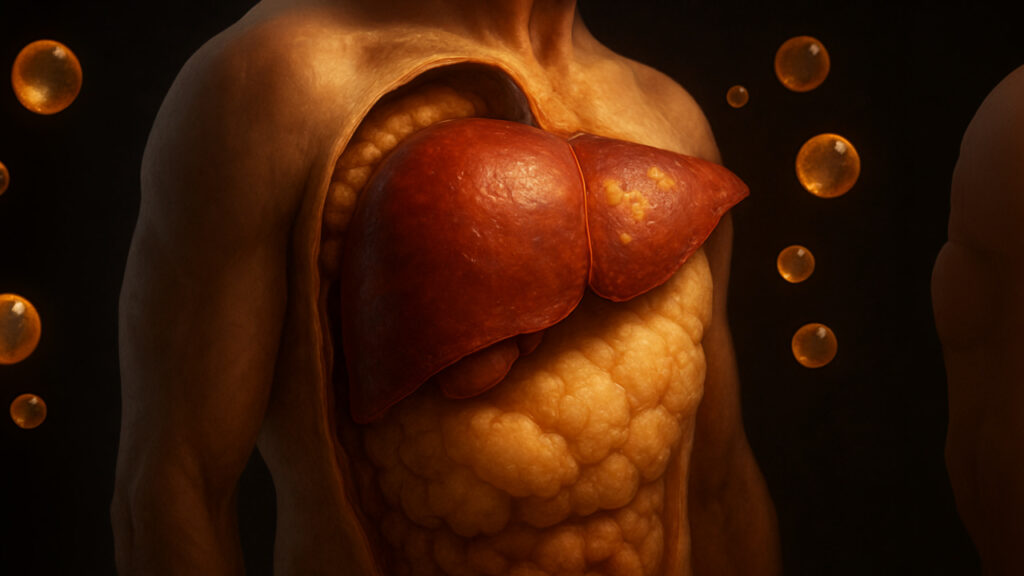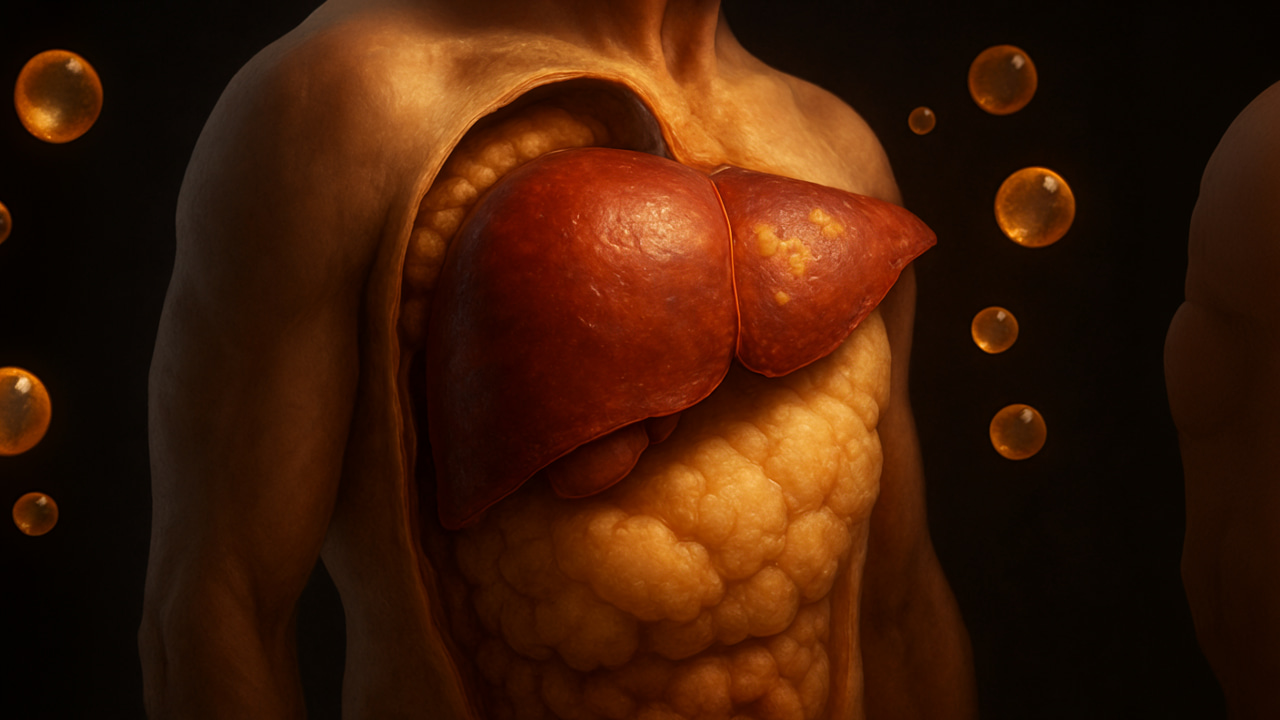The Link Between Blood Sugar, Liver Health, and Belly Fat
(Why You’re Gaining Fat Even If You’re Eating “Healthy”)
For years, I focused on cutting calories, working out more, and avoiding carbs — but my belly fat wouldn’t budge. I thought I had a blood sugar problem, or maybe my hormones were out of balance. But no one ever told me that the real root could be my liver.
The more I studied the connection between blood sugar, liver health, and weight gain, the more I realized that my body wasn’t broken — it was overwhelmed. And the belly fat I couldn’t lose? It was a symptom, not the problem.
In this post, I’ll break down what I wish someone told me earlier: how your liver controls blood sugar, and how this affects fat storage — especially around the stomach.

Table of Contents
Your Liver Regulates Blood Sugar More Than You Think
Most people think blood sugar is only about what you eat — but your liver plays a major role in storing and releasing glucose throughout the day. When your blood sugar drops too low, your liver releases stored sugar to keep you going. When it’s too high, your liver tries to process the excess.
But when your liver is overloaded with fat or toxins, it stops working efficiently. That creates blood sugar spikes and crashes, which lead to cravings, mood swings, fatigue, and — you guessed it — belly fat.
The Belly Fat Trap: Insulin, Liver, and Fat Storage
When your blood sugar stays high (even slightly), your body produces more insulin. That hormone tells your body to store fat — especially around the midsection. If your liver is struggling, it can’t regulate insulin well, and your body ends up in fat storage mode all day long.
That’s what was happening to me. I was eating “healthy,” but because my liver was congested, I was still stuck in a cycle of high blood sugar, insulin spikes, and belly fat storage. Once I started supporting my liver, the difference was immediate. My energy came back, my cravings dropped, and the fat started coming off — without changing my diet drastically.
How I Took Control: Supporting My Liver First
I didn’t want to go on another sugar detox or do something extreme. I started with a few simple shifts:
- Drinking water before coffee to reduce cortisol and help my liver flush out toxins
- Eating more fiber-rich foods like leafy greens and cruciferous vegetables
- Taking a liver support supplement every morning before food
- Walking for 10–15 minutes after meals to help control blood sugar naturally
These small changes added up fast. I felt lighter, my stomach flattened out, and I stopped feeling like I was at war with my body.
Why Supporting the Liver Reduces Cravings and Snacking
One of the biggest things I noticed? My sugar cravings disappeared. When your blood sugar is stable, you don’t feel like you need snacks every few hours. Supporting the liver helped my body stay in a balanced state, where I didn’t feel hangry, foggy, or desperate for something sweet after meals.
That made it so much easier to stay on track — because I wasn’t relying on willpower. I simply wasn’t hungry all the time anymore.
The Bottom Line
If you’re struggling with stubborn belly fat, don’t just look at diet or exercise. Look at the organ that manages your blood sugar, fat metabolism, and detox — your liver. When it’s working properly, everything else gets easier.
Whether your issue is cravings, insulin resistance, fatigue, or belly fat that just won’t move — supporting your liver could be the missing piece.
And if you want a gentle, daily way to support your liver, I personally use this natural supplement. It’s been a game changer for my energy, my weight, and my peace of mind.
What really opened my eyes was realizing that you can have unstable blood sugar even without eating sugar. I thought if I avoided desserts, I was safe. But things like white bread, low-fat snacks, energy bars, or even too much fruit were quietly spiking my blood sugar — and my liver couldn’t keep up.
I started paying attention to how I felt after meals. If I got sleepy, bloated, or craved something sweet within an hour, it was a sign that my blood sugar was crashing. That was a red flag that my liver wasn’t handling glucose well. Once I shifted my meals to include healthy fats and fiber, those symptoms faded.
I also learned how your liver is essential for balancing estrogen and cortisol, two hormones that heavily affect belly fat in women. If your liver is overloaded, it can’t process hormones effectively, leading to bloating, mood swings, and — again — fat stored around your waist.
This connection isn’t just about food. Stress affects your liver too. When you’re constantly in fight-or-flight mode, your body releases more glucose for “emergency energy” — but if you’re not burning it off, it gets stored as fat. Supporting my liver helped me stay more resilient, and I stopped reacting so strongly to stress.
Once I focused on repairing my liver, I didn’t have to force weight loss anymore. My metabolism felt like it was finally working with me instead of against me. I wasn’t hungry all day, and I didn’t feel like my body was stuck in fat-storing mode 24/7.
Another thing that helped? Drinking warm water with lemon or apple cider vinegar before meals. It sounds small, but it preps the liver for digestion and helps manage blood sugar spikes after eating. Paired with my daily supplement routine, it was a powerful combo.
I also want to mention that poor liver function can lead to slow thyroid activity. Your liver helps convert thyroid hormones to their active form — and when that process slows down, your energy tanks, and your metabolism crawls. No matter how clean you eat, it feels like nothing’s changing.
I used to think I just needed more discipline. But the truth is, I needed cellular support — not stricter rules. Supporting my liver helped me naturally balance insulin, reduce inflammation, and finally unlock stubborn belly fat that had been holding on for years.
A big part of this journey was learning to listen to my body. When I ate something and felt foggy, tired, or puffy afterward, it was feedback. My liver was telling me what it could — and couldn’t — handle. And once I respected that signal, things started to improve quickly.
If you’re a woman over 30, this becomes even more important. Hormonal shifts make your liver work harder. By keeping it strong, you give your body the chance to burn fat, stabilize energy, and reduce bloating without having to starve yourself or live at the gym.
Looking back, the key wasn’t cutting carbs or doing another detox — it was supporting my liver every day, in simple, consistent ways. The belly fat I hated so much was a symptom of deeper stress my liver was carrying. Once I lightened its load, everything else started working better.
The most encouraging part? This isn’t a quick fix — it’s a foundation. When you support your liver, you support every major function tied to weight, energy, and wellness. That’s why I still take my daily supplement every morning — not just to stay lean, but to feel my best from the inside out.

